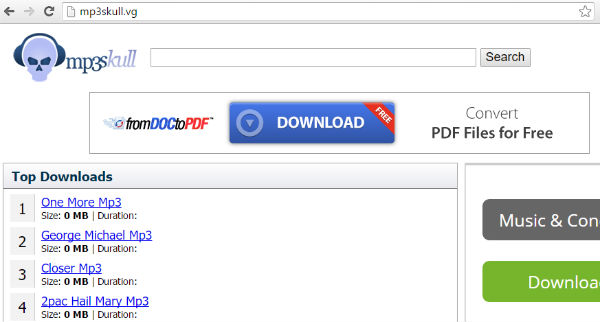 Representing various major record labels, the RIAA filed a lawsuit against MP3Skull last year.
Representing various major record labels, the RIAA filed a lawsuit against MP3Skull last year.
With millions of visitors per month the MP3 download site had been one of the prime sources of pirated music for a long time, frustrating many music industry insiders.
Although the site was facing a claim of millions of dollars in damages, the owners failed to respond in court. This prompted the RIAA to file for a default judgment, with success.
Earlier this year a Florida federal court awarded the labels more than $22 million in damages. In addition, it issued a permanent injunction which allowed the RIAA to take over the site’s domain names.
However, despite the million dollar verdict, MP3Skull still continues to operate today. The site actually never stopped and simply added several new domain names to its arsenal, with mp3skull.vg as the most recent.

The RIAA is not happy with MP3Skull’s contempt of court and has asked Cloudflare to help out. As a CDN provider, Cloudflare relays traffic of millions of websites through its network, including many pirate sites.
According to the RIAA, Cloudflare should stop offering its services to any MP3Skull websites, but the CDN provider has thus far refused to do so without a proper court order.
To resolve this difference of opinion, the RIAA has asked the Florida federal court for a “clarification” of the existing injunction, so it applies to Cloudflare as well.
In practice, this would mean that Cloudflare has to block all currently active domains, as well as any future domains with the keyword “MP3Skull,” which are tied to the site’s known IP-addresses.
“Cloudflare should be required to cease its provision of services to any of the Active MP3Skull Domains, as well as any website at either 89.46.100.104 or 151.80.100.107 that includes ‘MP3Skull’ in its name,” RIAA argued.

However, Cloudflare believes that this goes too far. While the company doesn’t object to disconnecting existing accounts if ordered to by a court, adding a requirement to block sites based on a keyword and IP-address goes too far.
The proposed injunction goes well beyond the scope of the DMCA, the CDN provider informs the court in an opposition brief this week (pdf).
“…Plaintiffs’ proposed injunction would force Cloudflare —which provides services to millions of websites— to investigate open-ended domain letter-string and IP address combinations to comply with the injunction.
“Cloudflare believes that this Court should hold the Plaintiffs accountable for following clear rules of the road,” Cloudflare adds.
The company suggests that the court could require it to terminate specific accounts that are found to be infringing, but doesn’t want to become the RIAA’s copyright cop.
“What Cloudflare cannot do, and which the Court should not require, is to serve as a deputy for the Plaintiffs and their RIAA trade association in investigating and identifying further targets of an injunction.”
To outsiders the difference between RIAA’s request and what Cloudflare suggests may seem small, but the company draws a clear line to prevent having to scan for pirate sites, proactively. This could turn into a slippery censorship slope, they feel.
This isn’t the first time that the RIAA has requested a keyword ban. In a similar case last year Cloudflare was ordered to terminate any accounts with the term “grooveshark” in them. However, in this case the RIAA owned the trademark, which makes it substantially different as it doesn’t involve the DMCA.
The EFF applauds Cloudflare’s actions and hopes the court will properly limit the scope of these and other blocking efforts.
“The limits on court orders against intermediaries are vital safeguards against censorship, especially where the censorship is done on behalf of a well-financed party,” EFF’s Mitch Stoltz writes.
“That’s why it’s important for courts to uphold those limits even in cases where copyright or trademark infringement seems obvious,” he adds.
The Florida court is expected to rule on the RIAA’s injunction demands during the days to come, a decision that will significantly impact future blocking requests.





